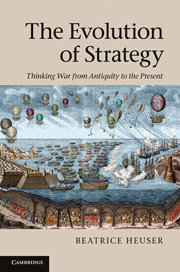Book contents
- Frontmatter
- Contents
- Acknowledgements
- A note on referencing
- Part I Introduction
- PART II Long-term constants
- PART III The Napoleonic paradigm and Total War
- PART IV Naval and maritime Strategy
- PART V Air Power and nuclear Strategy
- PART VI Asymmetric or ‘small’ wars
- 15 From partisan warfare to people’s war
- 16 Counterinsurgency
- PART VII The quest for new paradigms after the World Wars
- Bibliography
- Index
15 - From partisan warfare to people’s war
from PART VI - Asymmetric or ‘small’ wars
Published online by Cambridge University Press: 05 June 2012
- Frontmatter
- Contents
- Acknowledgements
- A note on referencing
- Part I Introduction
- PART II Long-term constants
- PART III The Napoleonic paradigm and Total War
- PART IV Naval and maritime Strategy
- PART V Air Power and nuclear Strategy
- PART VI Asymmetric or ‘small’ wars
- 15 From partisan warfare to people’s war
- 16 Counterinsurgency
- PART VII The quest for new paradigms after the World Wars
- Bibliography
- Index
Summary
‘The Way’ means inducing the people to have the same aim as the leadership, so that they will share death and share life, without fear of danger.
(Sun Tzu c. 500–300 BCE: 1)I prove to the conquering peoples the folly of wanting to invade a country where the threatened nation is disposed to … rise up spontaneously, en masse.
(Le Mière de Corvey 1823: xivf.)Two meanings of ‘small war’
Armies with state-of-the-art weaponry, fighting pitched battles against armies of similar size, similar organisation and similar equipment, both representing recognised states and governments, fighting according to unspoken or even legally encoded rules – these are the characteristics of what is thought of as conventional, symmetric warfare. At the high end of the quantitative spectrum, this is termed major war, and whole nations might be mobilised in its support. At the low end it may be a limited engagement like those of the ‘cabinet wars’ of the eighteenth century, often indecisive and perhaps even relatively clement on populations in general.
By contrast, this chapter deals with wars fought between parties that are fundamentally unequal, though not in all respects, as we shall see. Crucially – and increasingly over the centuries – they have been unequal in that one side has authority, a recognised claim to a monopoly of power and increasingly a state apparatus in some form, mostly including ‘regular’ armed forces, usually with more powerful weapons. The other side tends to lack all or most of those attributes, but by their very insurgence challenge the authority and position of their adversaries. The British officer Charles E. Callwell, who has many valuable insights to offer despite his sickeningly racist terminology, distinguished three sub-categories: ‘campaigns of conquest or annexation’ against an enemy inferior usually in equipment and army size; ‘campaigns for the suppression of insurrection or lawlessness or for the settlement of conquered or annexed territory’; and finally ‘campaigns undertaken to wipe out an insult, to avenge a wrong, or to overthrow a dangerous enemy’ (Callwell 1896/1906: 25). Of these, the second category is probably encountered most frequently today. While for the Western powers it usually means interference in the internal matters of a foreign country, for that country, ‘an insurgency is a civil war’, as the French theorist and practitioner David Galula (1919–67) realised (1964/2005: 2).
- Type
- Chapter
- Information
- The Evolution of StrategyThinking War from Antiquity to the Present, pp. 387 - 418Publisher: Cambridge University PressPrint publication year: 2010



